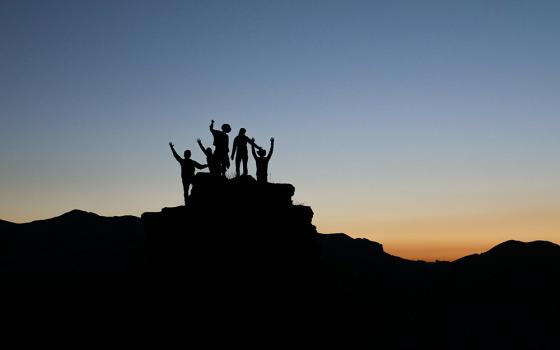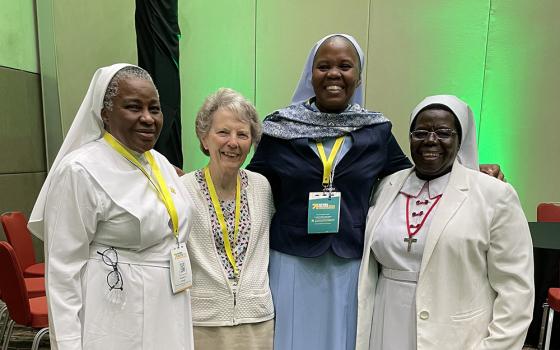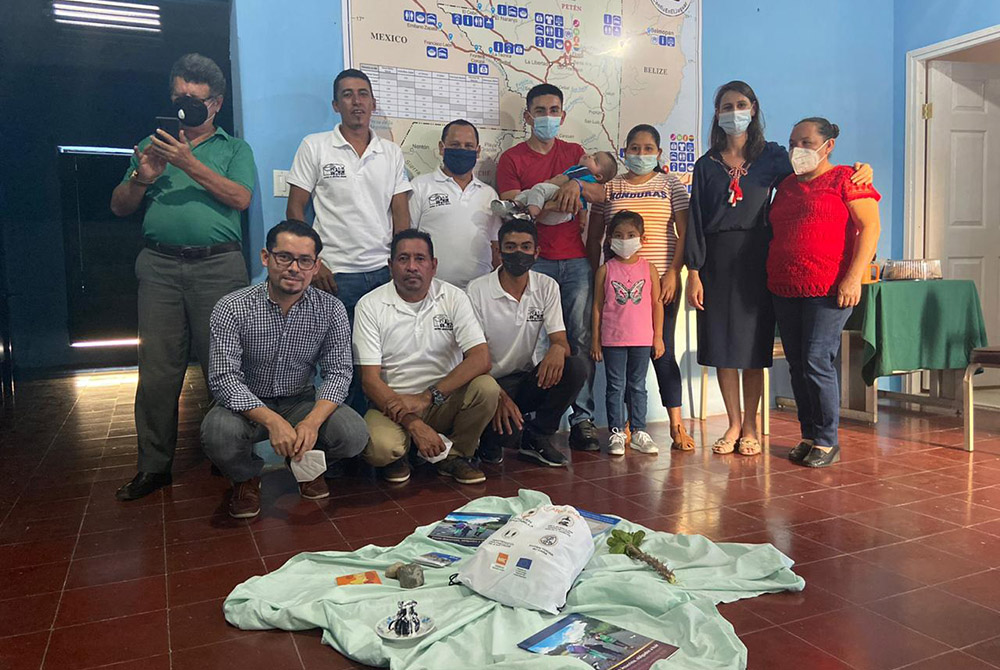
Scalabrinian Sr. Nyzelle Dondé, second from right, with Scalabrinian laity on their way to deliver food to Haitian migrants in Honduras in 2020. (Photo: courtesy of Sr. Nyzelle Dondé)
As if the pandemic wasn't enough.
The two hurricanes that struck Honduras only a couple of weeks apart — category 4 Hurricane Eta on Nov. 3 and category 5 Hurricane Iota on Nov. 16 — compounded the economic needs and desperation of Hondurans who already struggle to make ends meet in a normal year. Many had tried to flee following the economic hardships caused by the pandemic, joining a migrant caravan in early October only to be deported at the Guatemalan border to their former homes, which the hurricanes soon decimated.
But Scalabrini Sr. Nyzelle Dondé and her team are trying to help.
Dondé, who is originally from Brazil, is the director of Pastoral de Movilidad Humana, the Honduran bishops' migrant ministry. In the ministry's 30 years, its attention to migrants has evolved with the needs. At first, the ministry opened a transitional shelter in Ocotepeque and offered immediate services like food and health screenings. But in the past 12 years or so, the needs became great enough that they opened a migrant center in La Lima, where the staff can offer migrants a broad array of services, including psychologists and legal assistance. Last year, the pastoral group worked with about 40,000 people.
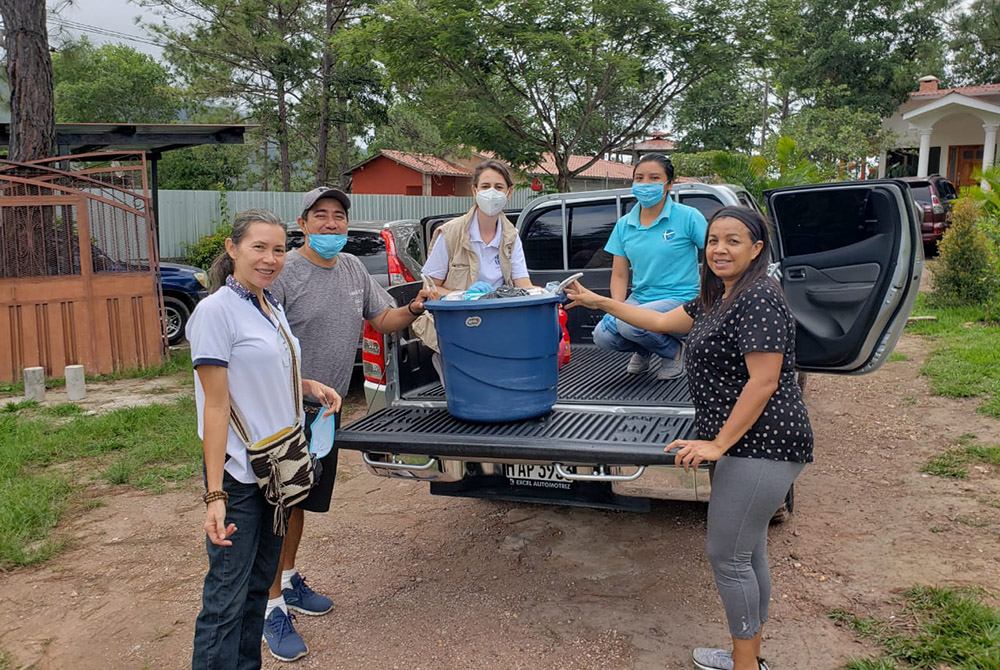
The team working at the migrant center of the episcopal ministry of Honduras in Ocotepeque shares a moment of reflection and gratitude in October. (Photo: courtesy of Sr. Nyzelle Dondé)
The center has had to adjust to the coronavirus like every other operation, offering services by phone or online and running donation drives as safely as possible, but now, some of the center's own staff now needs help, too, having been left destitute after the hurricanes.
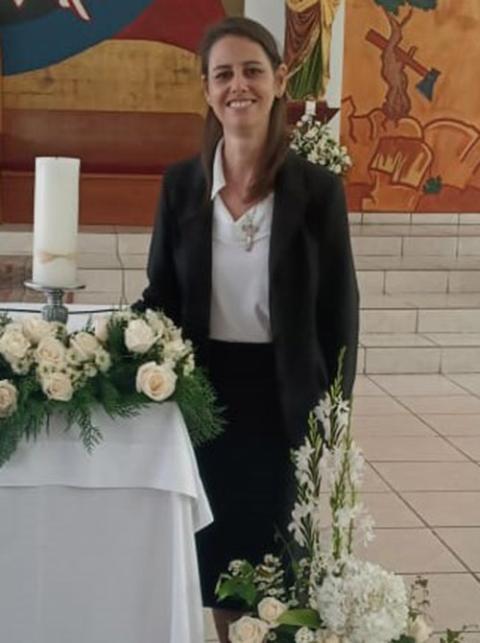
Scalabrinian Sr. Nyzelle Dondé (Photo courtesy of Sr. Nyzelle Dondé).
Dondé moved to Honduras from Mexico in February 2020, a month before the global pandemic swept the region.
GSR: Tell me about migrants that the ministry serves. How do their needs vary?
Dondé: We sort the migrants into four categories, each of which require different services from different agencies within the ministry.
One group that the ministry works with are migrants who have been deported back to Honduras and who come back with disabilities, having suffered accidents on the route. We see a variety of accidents, particularly those who rode La Bestia [a network of freight trains that runs the length of Mexico, popular among migrants who attempt riding on the roofs], and have fallen off, had bilateral amputations, dismembering.
Another group we work with includes the family members of migrants who have disappeared. We offer psychological services and, in partnership with another organization, legal assistance for those who are searching for their missing loved ones. Sadly, some of their loved ones return in the form of ashes or remains. Some spend years or decades hopeful that they'll find their child or loved one.
Advertisement
We also work with internal displacement, those who have been threatened or attacked and are in danger and need to be relocated out of the country or to a safer region. We have psychologists who interview those who are internally displaced, and we help them coordinate logistics.
Our last group is migrants who have been deported back to La Lima. One way we help them is by offering mental health services because the ministry understands how great that need is in a migrant. Yes, they need help physically, and that may be obvious with some, but they need help mentally, too. It's something that's not discussed enough with migration. Not only have they experienced a lot of trauma and awful experiences, but they also need to re-establish themselves, figure out their livelihoods and how they'll support their families. So the ministry helps them chart a path forward.
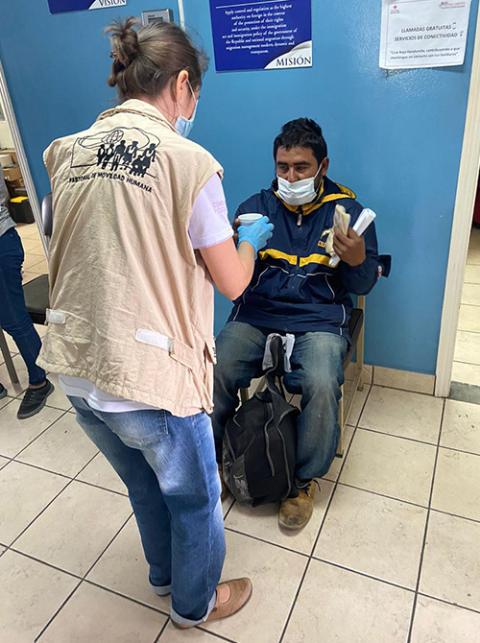
Scalabrinian Sr. Nyzelle Dondé offers food to migrants deported from the United States or Mexico at an airport in Toncontín, Honduras (Photo: courtesy of Sr. Nyzelle Dondé)
The caravan that had left Honduras in October: Earlier in our conversation, you referred to it as the "frustrated caravan." Why's that?
Of the 3,000 or 4,000 in that caravan, many were barred from continuing their journey largely by the Guatemalan authorities at the border. I don't have an exact number.
That's why I call it "frustrated," because so many were sent home before reaching Guatemala, and now they have to live in their frustrations, without job offers or economic possibilities, having to stay in Honduras. And I put that on Honduras: Everyone has a right to migrate, but Honduras needs to provide alternatives to migrating because it is also everyone's right to be able to stay home in one's own country, one's own land, and lead a dignified life.
Migration in Honduras is a historic phenomenon, though in the past, it was internal. Hurricane Mitch in 1998, in particular, drove migration. And around 2008, 2009, the reasons became structural. Honduras is a country of great natural resources, but they don't generate jobs. And the only option they feel they have is to leave and make a life outside Honduras.
Honduras ultimately exports migrants. It's a migratory country, and our authorities don't make them an offer to stay. So when we talk about why they leave, it's simply a part of our culture: exodus and finding alternatives for survival.
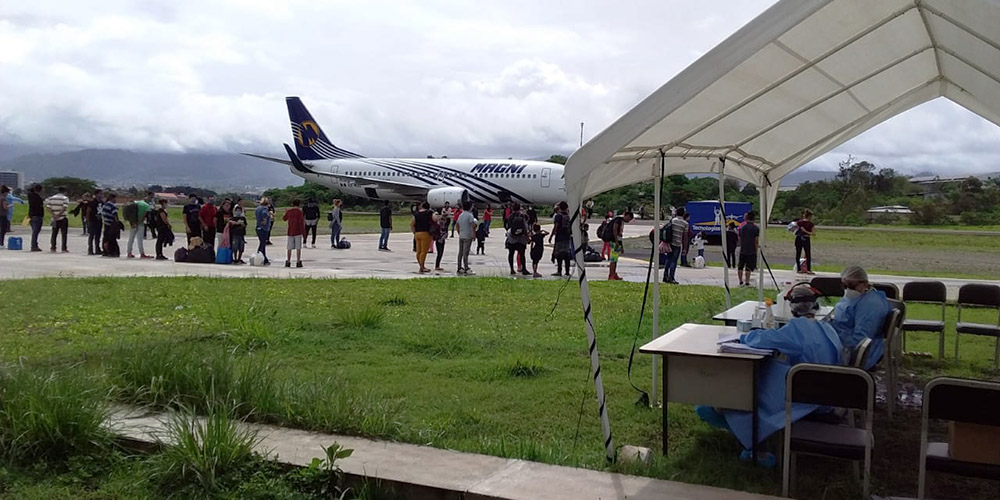
"Once deportations began to occur frequently by air, the [Honduran bishops' migrant] ministry began accompanying migrants at the airport" in Toncontín, Honduras, explained Scalabrinian Sr. Nyzelle Dondé. (Photo: courtesy of Sr. Nyzelle Dondé)
How have the pandemic and hurricanes affected your ministry? Did they diminish migration at all or encourage it?
COVID-19 has paralyzed mass migration, but individuals are still migrating, still desperate.
I can only speak from my perspective, working with the church and migrants, but this has created an incredibly strong chain of solidarity. In the beginning of the coronavirus, the ministry launched a campaign, Hands in Solidarity, and we received a lot of food and clothing donations for deported migrants. And we're still continuing the campaign, collecting donations while still observing all the safety measures for the pandemic.
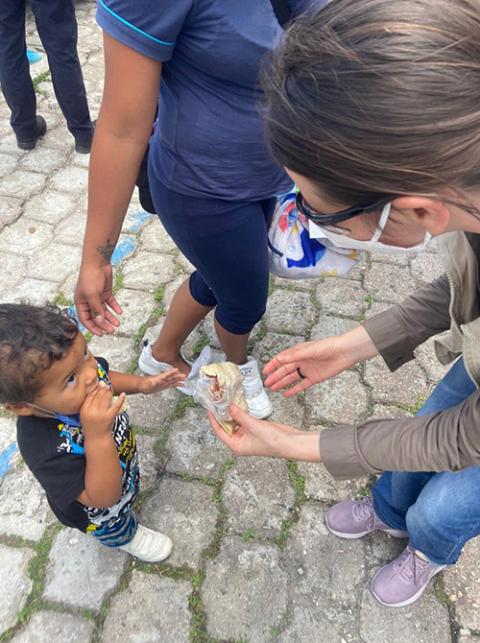
Scalabrinian Sr. Nyzelle Dondé offers food to migrants deported from the United States or Mexico at an airport in Toncontín, Honduras (Photo courtesy of Sr. Nyzelle Dondé).
But the hurricanes have devastated a lot of our personnel, so now, we're also asking for cash donations to support those who have lost practically everything. So we're still campaigning for solidarity. The pandemic hadn't even ended before we were hit with Hurricane Eta that devastated so many. And it's likely that those who were left with nothing after the hurricanes will try their luck on the migration route.
Since you have experienced such a tumultuous first year and met so many individuals who experience hardship, I'm curious how this ministry has affected you personally.
It's touched me hard, as they say around here. When I got here, it was all new to me. I was navigating a new context of Honduran history, navigating the many facets of the ministry, its history and the groups it serves, but above all, becoming familiar with the many life stories that the ministry serves and accompanies. It was a big responsibility — if I'm being honest, it was heavy and difficult — but at the same time, I could sense God's presence, actively threading the tapestry of the months I've been here in Honduras.
I see God's face in all those motivated to help their neighbor. It may sound simple, but it's so powerful when members of my team say, "Sister, don't worry about my month's pay; put it toward those who need it." This kind of gesture moves me deeply, because there's so much empathy and compassion in each person, and that goes a long way for the migrants. The people are really devoted to the well-being of migrants with their whole hearts.
It's an invitation to me, personally, as a Scalabrini Missionary, to carry out the spirit of our foundress and accompany our migrants, support them, offer words of comfort and faith and the security that God is with them. This is our mission on Earth, and despite the difficulties we face personally or as a society, it's a confirmation that God wants me here in this place, and I am his instrument for these people.
[Soli Salgado is a staff writer for Global Sisters Report. Her email address is ssalgado@ncronline.org. Follow her on Twitter: @soli_salgado.]

